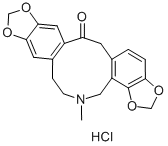Description
Protopine is an alkaloid found in
Berberidaceae,
Ranunculaceae,
Rutaceae,
Fumariaceae, and
Papaveraceae with diverse biological activities. It inhibits platelet aggregation induced by ADP, arachidonic acid (Item Nos.
90010 |
90010.1 |
10006607), platelet-activating factor (PAF), and collagen in rabbit platelet-rich plasma at a concentration of 100 μM. Protopine inhibits contraction of isolated rat thoracic aorta induced by norepinephrine and is a non-selective inhibitor of I
Ca, I
K, I
K1, and I
Na in guinea pig ventricular myocytes. Protopine inhibits the growth of
H. pylori with an MIC
50 value of 100 μg/ml. It reduces growth of PC3 and DU145 prostate cancer cells in a dose-dependent manner
via induction of mitotic cell cycle arrest. Protopine (0.005 mg/kg) increases latency to first seizure in a mouse model induced by pentylenetetrazole .
Uses
Protopine hydrochloride may be used in the calibration curve preparation for the quantification of alkaloids from
Fumaria capreolata using liquid chromatography coupled to diode array detection and electrospray ionization tandem mass spectrometry (LC-DAD-MS) and tandem mass spectrometry(MS/MS). It may also be used as an alkaloid in cytotoxicity and permeability studies carcinogenic cell lines.
General Description
Protopine is a celandine alkaloid and a bioactive compound associated with the plant families including fumariaceae, berberidaceae?and papaveraceae. It is metabolized by demethylenation in the presence of the cytochrome enzymes cytochrome P450 family 2 subfamily d polypeptide 1 (CYP2D1) and cytochrome P450 family 2 subfamily c polypeptide 11 (CYP2C11).
Biochem/physiol Actions
Protopine possesses anti-parasitic, antimicrobial and anti-inflammatory property. It mediates mitotic arrest by favoring tubulin polymerization. Protopine elicits anti-invasive effects in breast cancer tumor progression.. It also provides protection against oxidative stress-induced cell death.

